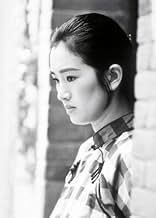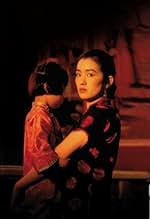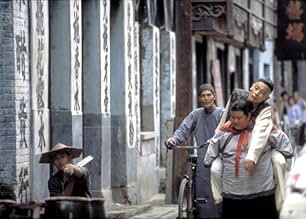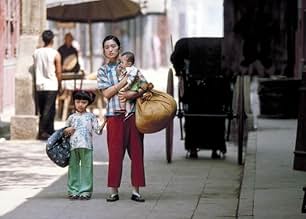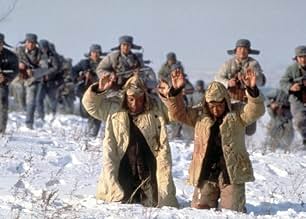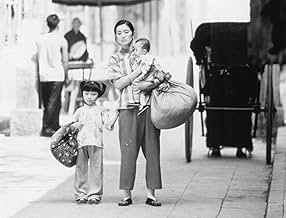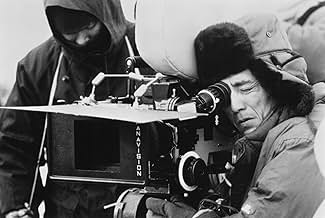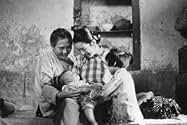Dopo che Fugui e Jiazhen persero le loro fortune personali, fondarono una famiglia e sopravvissero a difficili cambiamenti culturali negli anni '40 e '70 della Cina.Dopo che Fugui e Jiazhen persero le loro fortune personali, fondarono una famiglia e sopravvissero a difficili cambiamenti culturali negli anni '40 e '70 della Cina.Dopo che Fugui e Jiazhen persero le loro fortune personali, fondarono una famiglia e sopravvissero a difficili cambiamenti culturali negli anni '40 e '70 della Cina.
- Ha vinto 1 BAFTA Award
- 5 vittorie e 6 candidature totali
Recensioni in evidenza
But this film is so beautiful and so real, that it's unbearably heartbreaking at times. Every time I watch it, and I know a particular heartbreaking scene is coming up, I almost want to turn it off, but I'm just frozen in place, forced to experience the pain of the people on screen, that I've traveled three decades with. Zhang's understanding of the people of China, and the tragedy of history is full of empathy, respect, and adoration. In every scene, Gong Li embodies strength and beauty. Zhang's study of communism and of the Chinese government, isn't a villifying one sided argument, but one with complete understanding of the tragedy of this huge social experiment, that effected not only China, but the whole world.
As a Korean American, I draw some appreciation at the parallel effects on Communism on Korea. Mao-Kim, Taiwan-SouthKorea. But this is a truly universal movie, and anyone would enjoy it.
Both leading actors nicely portray the way their characters change over the years. At first, Fugui is the stereotypical "callow young man" and Jiazhen the even more stereotypical "long- suffering wife," but the screenplay and actors eventually deepen the characterizations.
The best sequence of the film covers the Chinese Civil War. Wisely, Yimou Zhang resists the temptation to make the movie too epic, and instead focuses on Fugui's personal experiences. The result is a very moving depiction of the human cost of war. In another striking touch, Fugui's hobby is singing with a shadow-puppet troupe. The puppets not only provide an interesting glimpse into traditional Chinese culture, they also take on a symbolic meaning.
After watching "To Live," it's easy to see why the Chinese authorities banned it: there's a lot of tragedy in the film, and in most cases, Communism is to blame. Remarkably, though, Zhang also makes many of the Communist characters sympathetic. For instance, Fugui and Jiazhen's daughter marries an officer in the Red Guards, who is a little ridiculous in his devotion to Mao Zedong, but not a villain. This is in keeping with the overall spirit of "To Live"--humanistic and subtle, instead of bombastic or propagandistic. It's both an important examination of recent Chinese history, and a universal story about how individual human beings manage "to live" in times of hardship. A rare combination, and one well worth seeing.
Most Chinese who lived through Mao's Revolution say this film tells it like it was at the simple townsperson level. Though it can serve as an overview of Chinese history 1944 to 1970 or so, unlike Lean's "Gandhi" or "Lawrence of Arabia", this is not a hero's biopic. Instead we see a foolish, once rich but now fallen heir and his wife blown about by the winds of fortune for three decades and challenged as parents trying to raise two children under increasingly harsh and punitive communist tyranny. What you sense in this film, that I've never seen before in any Chinese film, is how the ethical and moral principles that have prevailed in Chinese culture for 2500 years - a mix of transcendence and pragmatism, humility and grit, cosmic harmonic balance and social duty - allows an ordinary couple to accept unbearable tragedy and keep going. It also shows what this survival strategy costs them in their Communist context. The screenplay is full of cosmic irony. It makes us aware, without shouting, that this is just one family among millions. As Yimou's transitional screen message says: "...leaving no family unaffected". It is to that extent, a tribute film.
Maybe ten hours of Kieslowski's "Decalogue" might accomplish the same broad survey of of human happenstance and emotion. Maybe Kurosawa in three or four hours. But never in two plus hours have I seen the scope Zhang Yimou achieves here. "To Live" also contains as wise a moral lesson as any film I've seen, and it's a gentle one despite the surrounding violence. I couldn't paraphrase the lesson for you. I wouldn't try. Just watch. It will reach you non-verbally in about 90 minutes. Just know, this isn't Shakespeare, Hollywood or soap opera. It's something else.
Gong Li's work is as powerful as anything Streep or Sarandon have ever done in the west - which is all the more inspiring since the camera doesn't lavish star-level attention on her. As her husband, Ge You turns in an emotionally riveting, charming, sometimes funny and devastatingly honest performance. The direction is sure handed, the shooting unfailingly gorgeous. Zhang Yimou's cinematic canvass has never been so big or his palette so colorful and controlled. Full of spectacle, great sweeps of time and onrushing tides of humanity, "To Live" is still, in the end, a sweet and poignant epic with an intimate, observant heart. Great story telling. Do not miss! Try to view a letterbox version on a big screen.
I watched this movie because it had won the top award at Cannes. I hadn't high hopes for some reason, but I figured it was worth a look. I am very glad I did because it is a wonderful little piece that can be enjoyed with little knowledge of the regime against which it is set. The story follows the family's misfortunes and how they are affected by the rise of Chairman Mao. Their plight is touching as they suffer wrongs but also show compassion on others all the while trying to do the right thing by the system that is impacting on them. Even when tragedy occurs they never blame Communism but heap it on themselves instead.
This unfolds over many years with the rise of Mao as the backdrop. The parrellel between the two things is clear without being forced or rammed down our throats it's a wonderful bit of handling. Even better is the infusion of comic touches all the way through, the dialogue (even in subtitle form) is great and is witty and touching I laughed out loud many times.
Not having seen any other films by Zhang, I can only hope they are as good as this one. The cast, too, do a great job with the film. You Ge's Fugui is fabulous he is a draw from the start on, and his ageing is so convincing that credit must go not only to the makeup but also to Ge for doing so well with potentially tragic figure. Likewise Gong is superb but ages less convincingly. The support cast are all good from the children through to the figures of Mao like Jiang and Niu. The only thing that saddened me about the two great leads is to think that Western cinema will never care to have them in any films I guess that when it comes to Hong Kong cinema Hollywood only are interested if it has slow-motion and guns! (and they think they're cutting edge!)
Overall I find it very hard to fault this film as it has so much going for it on so many levels. Just as a human story it is excellent, and the historical context only serves to make it better. Comic and touching right to it's perfectly pitched close, this should be searched out by anyone who wants a genuinely moving human tale with political comment sown into each frame without intrusion.
Lantern was precisely contained within narrative walls, it abstracted life by placing us in the midst of turning cycles of life and wove cloths out of that turning in the form of rituals that marked passage; color, sound, weather, architecture. It was akin to a Buddhist mandala to me, a cosmic picture directing me to find my own place in the center of things, choose repose over madness.
Zhang by contrast here wanders unconstrained, under the auspice of history, aiming for a full chronicle of sorts of Chinese life as a family moves through the decades. The stage backdrop changes frequently; Civil war, Great Leap, Cultural Revolution.
We do still have the turning of cycles and it does create a (cosmic) picture; a life of comfort squandered by the man's ignorance who loses it all, to one of hardship and quiet abiding. But eventually it doesn't direct towards a center that will illuminate the turn as something more than the ramblings of history.
And it's simply not a very enviable position to want to be the chronicler of history like Zhang is trying to here, it reminds me of how Kusturica stifled himself in similar endeavors. It means our reference point always has to be an externally agreed version of reality and we have to be chained to that sweep.
You can see him try to root himself in something more essential - the husband becomes a puppeteer putting on shadow plays for the people, life as the canvas where these evanescent shadow plays are enacted, now losing a fortune, now gaining back your family, so that we could see it from the distance of transient flickers of drama. Civil war is introduced as someone hacking down the screen, revealing war as another play that demands its actors assume their place.
But this is forgotten in lieu of stopping at various points of history so that it ends up being more the Oscar winning type than history parting to reveal myriad reflections like Andrei Rublev. Had it come out from the West, I'm sure it would have won a few and the wonderful Gong Li her first. The best I got out of it eventually was the sense of a man and woman trying to make their way together as the skies shift and the stage quakes by the ignorance of unseen puppet masters enacting their little plays. The Great Leap castigated as a wall collapsing on a little boy, because the man who crashed his car and the boy were both overworked and needed sleep.
Zhang took care to color history within certain lines so that we veer close to the monumental failures of the era but never quite see the full brunt of the horror, famine or mass persecution, only bits of abuse in passing. It was still banned by Party hacks anxious to control the play.
Lo sapevi?
- QuizInitially, Director Zhang Yimou was forbidden from filmmaking for 5 years by the Chinese Communist Party as a result of making this film. However, due to outside pressure this was later withdrawn.
- Citazioni
Little Bun: [playing with chickens] When will they grow up?
Xu Jiazhen: Very soon.
Little Bun: And then?
Xu Fugui: And then... the chickens will turn into geese... and the geese will turn into sheep... and the sheep will turn into oxen.
Little Bun: And after the oxen?
Xu Fugui: After oxen...
Xu Jiazhen: After oxen, Little Bun will grow up.
Little Bun: I want to ride on an ox's back.
Xu Jiazhen: You will ride on an ox's back.
Xu Fugui: Little Bun won't ride on an ox... he'll ride trains and planes... and life will get better and better.
I più visti
- How long is To Live?Powered by Alexa
Dettagli
Botteghino
- Lordo Stati Uniti e Canada
- 2.332.728 USD
- Fine settimana di apertura Stati Uniti e Canada
- 32.900 USD
- 20 nov 1994
- Lordo in tutto il mondo
- 2.332.728 USD
- Tempo di esecuzione2 ore 13 minuti
- Colore
- Mix di suoni
- Proporzioni
- 1.85 : 1
Contribuisci a questa pagina



